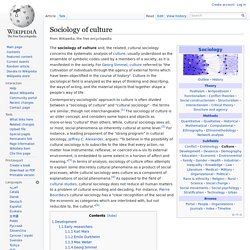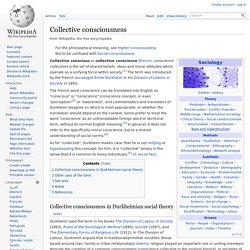

Sociology of literature. The sociology of literature is a subfield of the sociology of culture.

It studies the social production of literature and its social implications. A notable example is Pierre Bourdieu's 1992 Les Règles de L'Art: Genèse et Structure du Champ Littéraire, translated by Susan Emanuel as Rules of Art: Genesis and Structure of the Literary Field (1996). Classical sociology[edit] None of the 'founding fathers' of sociology produced a detailed study of literature, but they did develop ideas that were subsequently applied to literature by others. Karl Marx's theory of ideology was directed at literature by Pierre Macherey, Terry Eagleton and Fredric Jameson. Sociology of law. The sociology of law (or legal sociology) is often described as a sub-discipline of sociology or an interdisciplinary approach within legal studies.[1] Some see sociology of law as belonging "necessarily" to the field of sociology[2] whilst others tend to consider it a field of research caught up between the disciplines of law and sociology.[3] Still others regard it neither as a sub-discipline of sociology nor as a branch of legal studies but as a field of research on its own right within the broader social science tradition.

Sociology of law also benefits from and occasionally draws on research conducted within other fields such as comparative law, critical legal studies, jurisprudence, legal theory, law and economics and law and literature. Intellectual origins[edit] Sociology of knowledge. Economic sociology. Economic sociology is the study of the social cause and effect of various economic phenomena.

The field can be broadly divided into a classical period and a contemporary one. Sociology of culture. The sociology of culture and, the related, cultural sociology concerns the systematic analysis of culture, usually understood as the ensemble of symbolic codes used by a members of a society, as it is manifested in the society.

For Georg Simmel, culture referred to "the cultivation of individuals through the agency of external forms which have been objectified in the course of history". Culture in the sociological field is analyzed as the ways of thinking and describing, the ways of acting, and the material objects that together shape a people's way of life. Contemporary sociologists' approach to culture is often divided between a "sociology of culture" and "cultural sociology" - the terms are similar, though not interchangeable.[1] The sociology of culture is an older concept, and considers some topics and objects as more-or-less "cultural" than others. Development[edit] Early researchers[edit] Karl Marx[edit] Émile Durkheim[edit] Main article: Émile Durkheim Max Weber[edit] 1. 2. 3. 4. 5. Criminology. Criminology (from Latin crīmen, "accusation"; and Greek -λογία, -logia) is the scientific study of the nature, extent, management, causes, control, consequences, and prevention of criminal behavior, both on the individual and social levels.

Criminology is an interdisciplinary field in the behavioral sciences, drawing especially upon the research of sociologists, psychologists, psychiatrists, social anthropologists, as well as scholars of law. The term criminology was coined in 1885 by Italian law professor Raffaele Garofalo as criminologia. Later, French anthropologist Paul Topinard used the analogous French term criminologie.[1] Schools of thought[edit] In the mid-18th century criminology arose as social philosophers gave thought to crime and concepts of law. Classical school[edit] The Classical school of thought came about at a time when major reform in penology occurred, with prisons developed as a form of punishment. Positivist school[edit] Italian school[edit] Structuralism. In sociology, anthropology and linguistics, structuralism is the theory that elements of human culture must be understood in terms of their relationship to a larger, overarching system or structure.

It works to uncover the structures that underlie all the things that humans do, think, perceive, and feel. Alternatively, as summarized by philosopher Simon Blackburn, structuralism is "the belief that phenomena of human life are not intelligible except through their interrelations. These relations constitute a structure, and behind local variations in the surface phenomena there are constant laws of abstract culture".[1] In the 1970s, structuralism was criticised for its rigidity and ahistoricism. Collective consciousness. Collective conscious or collective conscience (French: conscience collective) is the set of shared beliefs, ideas and moral attitudes which operate as a unifying force within society.[1] The term was introduced by the French sociologist Émile Durkheim in his Division of Labour in Society in 1893.

The French word conscience can be translated into English as "conscious" or "conscience" (conscience morale), or even "perception"[2] or "awareness", and commentators and translators of Durkheim disagree on which is most appropriate, or whether the translation should depend on the context. Some prefer to treat the word 'conscience' as an untranslatable foreign word or technical term, without its normal English meaning.[3] In general, it does not refer to the specifically moral conscience, but to a shared understanding of social norms.[4] Collective consciousness in Durkheimian social theory[edit]
Group mind (science fiction) A group mind, hive mind, mind coalescence or group ego in science fiction is a single, collective consciousness or intelligence occupying many bodies or entities.

Its use in literature goes back at least as far as Olaf Stapledon's science fiction novel Last and First Men (1930).[1][2] A group mind might be formed by telepathy, by adding brain-to-brain communication to ordinary individuals, or by some unspecified means. This term may be used interchangeably with "hive mind". A hive mind is a group mind with almost complete loss (or lack) of individual identity; most fictional group minds are hives. The concept of the group or hive mind is an intelligent version of real-life superorganisms such as an ant colony or beehive, and consequently, insectoid aliens such as Zerg and Ceph often have such a mind. The Akatsuki leader Pain in the manga Naruto has six bodies that share the same mind.